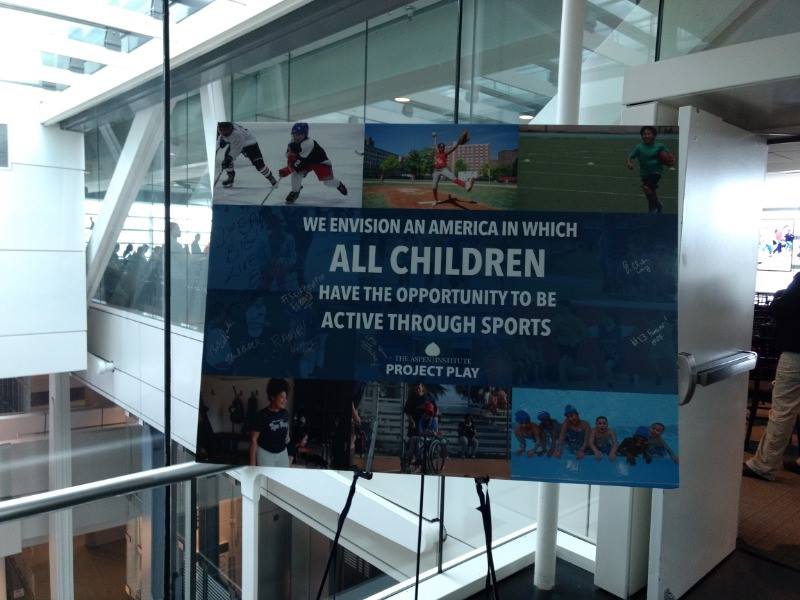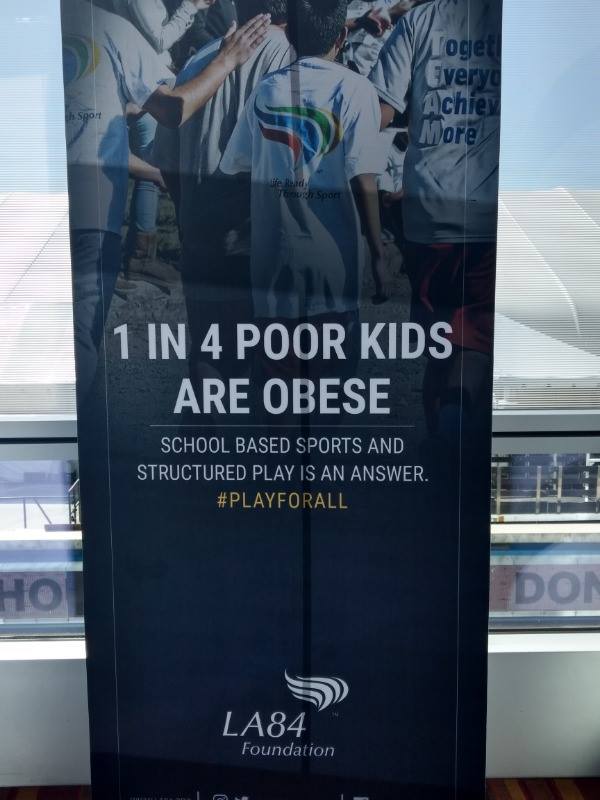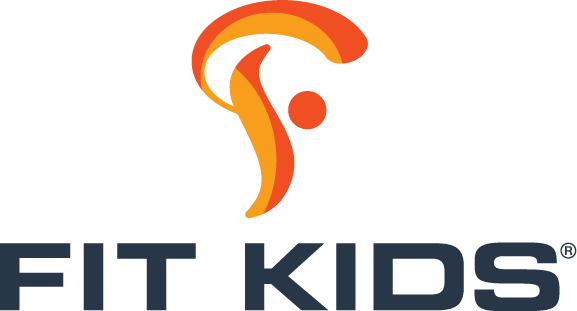By David Jacobson, Fit Kids Marketing and Communications Consultant
Just outside the Aspen Institute Sports and Society Program’s Project Play Summit last month, I saw a good sign, literally and figuratively. Standing on an easel, the sign read: “We envision an America in which all children have the opportunity to be active through sports.”

That was a welcome sign for Fit Kids, showing we had arrived at the right place at the right time, even as epidemics of youth obesity and other ills resulting from physical inactivity rage throughout our country. I walked past the sign into a room, working on behalf of Fit Kids to help solve these problems, along with some 400 other thought leaders in sports, fitness and youth development, who represented teams, leagues, corporations, non-profits, Olympic governing bodies, media outlets, and government agencies.
Tom Farrey, Executive Director of the Sports and Society Program and a frequent collaborator throughout the last dozen or so years of my career, welcomed us and outlined an incredible agenda, with such highlights as:
– Kobe Bryant leading a panel discussion with four athletes ages 11-13, titled “What if Youth Designed Youth Sports?”
– Strategy sessions, including one on “Reintroducing Free Play”
– Another session with Kobe on “The Meaning of Play” with Kevin Carroll, a childhood friend of Kobe’s and author of Rules of the Red Rubber Ball
– Master of Ceremonies and legendary broadcaster Mary Carillo, interviewing first Olympic Champion Jackie Joyner-Kersee and then skateboarding pioneer Tony Hawk.
Beyond the obvious star power, it was exciting to learn how all are on the front lines of youth sports and fitness issues. Hearing Kobe explain the challenges of coaching his kid’s middle school basketball team sounded eerily familiar, made us peers for a moment and provided hope for a future in which the rich, powerful and vastly experienced turn their attention to youth sports and fitness. Tony Hawk’s take on how he fit into skateboarding when he did not fit so well elsewhere sent a powerful message to millions of kids left behind by the ever-growing elite youth sports power structure.
The exchanging of ideas, stories and business cards throughout the sessions and into the evening networking event created great potential for Fit Kids to partner and collaborate with any number of like-minded organizations. At the end of the day, all signs pointed to a bright future.
From the heights of the Project Play Summit, I flew to Los Angeles for the LA84 Foundation Summit, convening hundreds more thought leaders in our field. The event surpassed in inspiration its aspirational title: “Athlete Activism & Social Justice: Taking Action for Our Youth.”
Even before the sessions started, attendees could feel the spirit of improving the world through sports by standing in the footsteps of giants. We were given a photo-op atop a replica Olympic podium in front of a sign depicting the iconic moment when Tommie Smith and John Carlos raised fists during the medal ceremony at the 1968 Olympics. We had the choice of holding one of the Olympic torches on display or donning a black glove and emulating the stance of Smith and Carlos.
Again, on the way into the working sessions, I saw signs of like-mindedness, such as an LA84 banner that read: “1 in 4 poor kids are obese. School based sports and structured play is an answer. #PlayForAll”

The on-stage content soared from the start, with opening presentations by LA84 Foundation President and CEO Renata Simril, as well as Master of Ceremonies Sal Masekela, the TV personality and son of the late South African anti-apartheid activist and musician Hugh Masekela. Other highlights, in no particular order, included:
– “The Legacy of the 1968 Olympic Games and Its Impact Today” with James Blake (former tennis star, who suffered a police brutality incident caught on video in New York City), Tony Dungy and Mike Tirico of Sunday Night Football, and Olympic Medalists Greg Louganis and Ibtihaj Muhammad, who are outspoken on gay and Muslim issues, respectively.
– More panels and presentations that powerfully positioned access to fitness opportunities as a matter of equity and social justice, reflecting LA84’s #PlayForAll. The biggest-name participants included Chris Borland, who famously retired young from the 49ers to preserve his brain health; Metta World Peace, past NBA Champion player, who is outspoken about mental health issues; several Paralympians and their advocates; Jordyn Wieber, Olympic Gymnastics Gold Medalists and sexual-abuse survivor; Pro Football Hall of Famer Eric Dickerson with ESPN’s Cari Champion on “Standing Up for Change;” and NBA star Paul George on “In Pursuit of Greatness.”
– “Why I Coach” by Serena Limas, college student, LA84 intern and 2018 recipient of Coaching Corps’ Volunteer Coach of the Year award, who gave her answer in a moving throw-down that melded essay with poetry slam.
– A panel discussion titled “P.E. is a Social Justice Issue: Working Together to Support Our Youth” with Nichol Whiteman, Executive Director of the Los Angeles Dodgers Foundation, which funds Fit Kids Programs in Los Angeles; Christa Gannon, Founder and Executive Director of Fresh Lifelines for Youth, which helps prevent youth from entering or returning to the juvenile justice system; and leaders of several other organizations.
After that panel, audience members could reflect or ask questions. I practically shot out of my chair, and promptly received the roving microphone. To set context for my question, I explained Fit Kids to the crowd, mentioning our work at a dozen L.A. schools, due largely to funding from the Dodgers Foundation and Los Angeles Lakers Youth Foundation and our collaborations with Positive Coaching Alliance, LA84, and the Saint Sebastian Sports Project.
I then asked any of the panelists to compare, in light of #PlayForAll, the impact of organized team youth sports to that of programs like Fit Kids, which offer structured fitness opportunities for every kid, regardless of skill level or interest in sports. The answer, essentially, was “Great question, but we’re getting the signal that we’re out of time.”
A few people approached me afterward, seeking more information about Fit Kids. All of them received our brochure and a promise, since kept, of follow-up emails to explore how our shared paths can lead to better health and fitness for more kids. All signs point to this working out very well.
